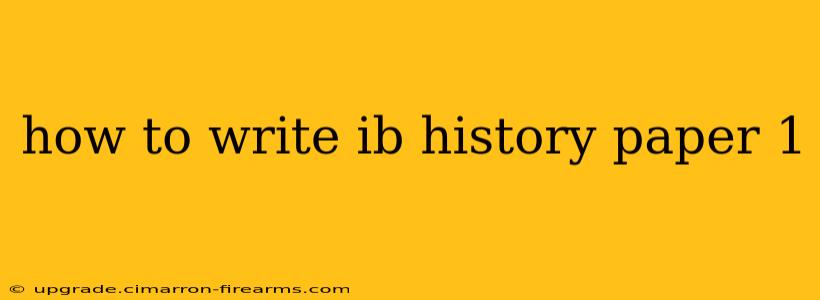IB History Paper 1 can be daunting, but with the right strategy and preparation, you can achieve a high score. This guide will break down the exam format, offer effective study techniques, and provide tips for writing compelling essays that impress examiners.
Understanding the IB History Paper 1 Format
Paper 1 focuses on source analysis, testing your ability to interpret historical documents and synthesize information from multiple sources. You'll encounter three sources – typically a combination of primary and secondary sources – relating to a specific historical event or issue. You'll then answer two questions:
- Question 1 (Source Comparison): This requires you to compare and contrast the content, origin, purpose, and value of two of the provided sources. This tests your understanding of source evaluation (OPVL – Origin, Purpose, Value, Limitations).
- Question 2 (Synthesis and Argumentation): This question asks you to use the sources and your own knowledge to answer a specific question about the historical event or issue. This tests your analytical skills and ability to construct a well-supported argument.
Key Strategies for Success
1. Mastering Source Analysis (OPVL)
The foundation of a strong Paper 1 response is a thorough understanding of OPVL:
- Origin: Who created the source? When? What is their background and potential biases?
- Purpose: Why was the source created? What message was the creator trying to convey?
- Value: What insights does the source offer? What is its usefulness in understanding the historical event?
- Limitations: What are the potential weaknesses of the source? What information is missing or unreliable?
Practice analyzing various sources – images, maps, letters, newspaper articles, excerpts from books – applying OPVL consistently.
2. Developing Strong Argumentation Skills
Your response to Question 2 requires a well-structured argument supported by evidence from the sources and your own knowledge. Follow these steps:
- Analyze the question: Carefully dissect the question to identify the key terms and the specific task.
- Construct a thesis statement: Your thesis should clearly state your argument and directly address the question.
- Develop supporting arguments: Each paragraph should focus on a single supporting argument, linked back to your thesis. Use evidence from the sources and your own knowledge to back up your claims.
- Acknowledge counterarguments: Addressing potential opposing viewpoints demonstrates critical thinking and strengthens your overall argument.
- Conclude effectively: Summarize your main points and restate your thesis in a new way.
3. Time Management is Crucial
Allocate your time wisely. Spend approximately 25 minutes on Question 1 and 35 minutes on Question 2. Stick to your time schedule to ensure you address both questions thoroughly.
4. Practice, Practice, Practice
The key to success is consistent practice. Work through past papers, paying attention to the mark scheme. Analyze your strengths and weaknesses and focus on improving areas where you struggle. Practice under timed conditions to simulate the exam environment.
5. Expand your Knowledge Base
While the sources are crucial, your own knowledge forms a vital part of Question 2. Ensure you have a solid understanding of the historical context relevant to the prescribed subjects.
Exam Day Tips
- Read the instructions carefully: Ensure you understand exactly what is being asked of you.
- Plan your responses: Before you begin writing, jot down a brief outline to structure your arguments.
- Use precise language: Avoid vague statements and be specific in your analysis and arguments.
- Proofread your work: Take a few minutes at the end to review your responses for any errors in grammar or spelling.
By diligently following these strategies and dedicating sufficient time to preparation, you can confidently tackle IB History Paper 1 and achieve the grade you desire. Remember, consistent practice and a deep understanding of source analysis are your greatest assets. Good luck!

